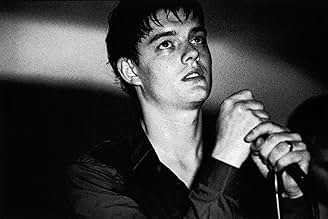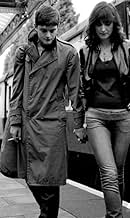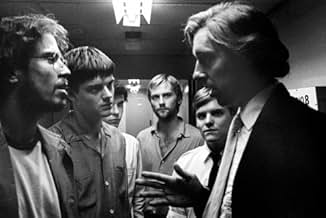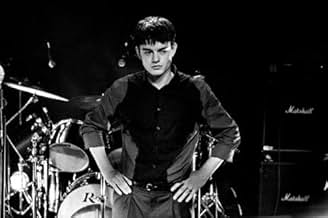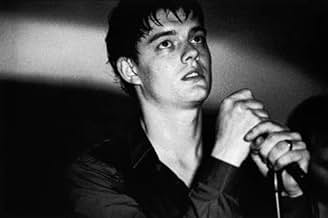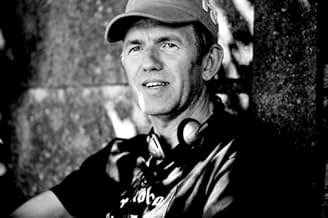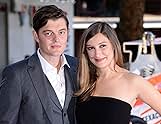ÉVALUATION IMDb
7,6/10
70 k
MA NOTE
Un profil de Ian Curtis, l'énigmatique chanteur de Joy Division dont les ennuis personnels, professionnels et romantiques l'ont conduit à se suicider à l'âge de 23 ans.Un profil de Ian Curtis, l'énigmatique chanteur de Joy Division dont les ennuis personnels, professionnels et romantiques l'ont conduit à se suicider à l'âge de 23 ans.Un profil de Ian Curtis, l'énigmatique chanteur de Joy Division dont les ennuis personnels, professionnels et romantiques l'ont conduit à se suicider à l'âge de 23 ans.
- Director
- Writers
- Stars
- A remporté le prix 1 BAFTA Award
- 31 victoires et 36 nominations au total
Martha Myers Lowe
- Ian's Sister
- (as Martha Myers-Lowe)
Mary Jo Randle
- Debbie's Mother
- (as Mary-Jo Randle)
Avis en vedette
Making the leap from photographer to music video director to film director, Anton Corbijn's feature length debut 'Control' is quite simply stunning. Shot entirely in black and white it tell the story of Ian Curtis the lead singer with Manchester band Joy Division but its also much more than that it also tells of one mans journey into the heart of darkness (Apocalypse Now is mentioned in the film) a journey of fear, paranoia, illness and depression. Curtis has been played in films before but only as bit parts (24 hour party people etc) here he is portrayed breathtakingly by Sam Riley who played Mark E Smith in 24 hour party people and when he first appears on the screen I have to admit I wasn't convinced but as Ian the person grows so too does Riley into the role and at times he has him so down to a tee its hard to imagine its not the real Curtis up there. The rest of the band are pretty good as well but are only really second fiddle to Riley but you have to give them credit for learning all the songs and playing them live rather than mime. Samantha Morton is great as the put upon wife Deborah and Craig Parkinson is convincing enough as Tony Wilson but apart from Riley's stand out performance its Toby Kebbell as manager Rob Gretton who has some of the best lines and has come so far since his role in 'Dead Man's Shoes'. The cinematography is a visual feast for the eyes, being shot in black and white adds to the mood and gives a haunting feel that echo's the music and lyrics of the band, it also means (and I guess its Corbijn's photography background) that so many of the shots in the movie could be still images they are framed so well. Although never really explained in terms of answers, Curtis's illness from the seizures to the depression and the hopeless sense of falling apart reminded me of Catherine Deneuve in Polanski's 'Repulsion' another black and white film that deals with madness. I guess that treating mental illnesses was still in its infancy in the seventies, yes we'd stopped electro-shocking people but medications were still being developed and trialled. It seems it was very easy for Curtis to reach a certain point what with juggling home, life on the road, his condition and the pressure of increasing fame but when it came to helping him out he really was on his own and did feel a sense of 'isolation'. But with a story that has a widely known end point its more about the journey and here Corbjin punctures the narrative with some truly witty moments while leading up the incredibly moving and inevitable finale. Handled brilliantly by all involved this is another example of a great British film that deserves all the accolades it is receiving and if this performance is anything to go by expect Riley to be very big indeed.
8tmk1
I saw this film last night then I went home and read a lot of the comments here. I think some things have been missed between the glowing reviews and the bitter disappointments.
First, it is a truly beautiful film and I found the acting uniformly excellent. That has already been said plenty of times.
More interesting to me are the comments about this not being an accurate or fair portrait of Ian Curtis and those around him. I've read plenty of accounts that characterize Ian and his band-mates as relentless practical jokers -- the book Torn Apart by Mick Middles and Lindsay Reade is full of these anecdotes. But I also think it's naive to expect a film like this to be anything close to a fair and objective telling of anyone's life. This is a dramatic interpretation, not a documentary.
In addition to the multiple meanings the title has for the characters in the film, this film is itself an exercise in CONTROL: Deborah Curtis's control over her husband's legacy; the surviving band members' control over the public image of Joy Division.
No, the film does not show the laughs and good times the band had, but this is in keeping with all of Joy Division's work. Their entire output as a living band was highly stylized. Almost everything they issued was in stark black and white; their imagery was overwhelmingly bleak and funereal; and they certainly courted controversy with their name and imagery. All of which was very consciously and tightly CONTROLLED by the band and the people at Factory. They gave few interviews and preferred to let the work speak for itself.
My point is that this film simply continues that project. It is yet another highly stylized piece of work in the Joy Division canon. To paraphrase the Tony Wilson remark that has been cited elsewhere in these comments -- when you have the choice between the legend and the facts, go with the legend. Their work has always had an epic, legendary quality. This movie is absolutely in keeping with that aesthetic.
I think it's also worth noting that Corbijn was a participant in shaping the Joy Division legacy from the very start -- his photographs of the band helped shape their image and his video for "Atmosphere" set the tone for how their legacy would be preserved. CONTROL is simply another collaboration with the band and their music. An extension of that original project.
I think that ultimately this film is an excellent piece of work. Just as Joy Division produced music of astonishing beauty and resonance out of the misery of life in post-industrial England, this film turns personal pain and loss into a powerful piece of art.
First, it is a truly beautiful film and I found the acting uniformly excellent. That has already been said plenty of times.
More interesting to me are the comments about this not being an accurate or fair portrait of Ian Curtis and those around him. I've read plenty of accounts that characterize Ian and his band-mates as relentless practical jokers -- the book Torn Apart by Mick Middles and Lindsay Reade is full of these anecdotes. But I also think it's naive to expect a film like this to be anything close to a fair and objective telling of anyone's life. This is a dramatic interpretation, not a documentary.
In addition to the multiple meanings the title has for the characters in the film, this film is itself an exercise in CONTROL: Deborah Curtis's control over her husband's legacy; the surviving band members' control over the public image of Joy Division.
No, the film does not show the laughs and good times the band had, but this is in keeping with all of Joy Division's work. Their entire output as a living band was highly stylized. Almost everything they issued was in stark black and white; their imagery was overwhelmingly bleak and funereal; and they certainly courted controversy with their name and imagery. All of which was very consciously and tightly CONTROLLED by the band and the people at Factory. They gave few interviews and preferred to let the work speak for itself.
My point is that this film simply continues that project. It is yet another highly stylized piece of work in the Joy Division canon. To paraphrase the Tony Wilson remark that has been cited elsewhere in these comments -- when you have the choice between the legend and the facts, go with the legend. Their work has always had an epic, legendary quality. This movie is absolutely in keeping with that aesthetic.
I think it's also worth noting that Corbijn was a participant in shaping the Joy Division legacy from the very start -- his photographs of the band helped shape their image and his video for "Atmosphere" set the tone for how their legacy would be preserved. CONTROL is simply another collaboration with the band and their music. An extension of that original project.
I think that ultimately this film is an excellent piece of work. Just as Joy Division produced music of astonishing beauty and resonance out of the misery of life in post-industrial England, this film turns personal pain and loss into a powerful piece of art.
Ian Curtis had suffered more than any man should. Like most depressives, he was difficult to be understood by those around him. A teenager living in a Manchester suburbia turned post-punk rocker--lead singer/songwriter for the now infamous Joy Division--married at a young age, father to a child and dead by hanging at 23.
Despite "Control" being made by the stunning music video director and photographer Anton Corbijn, and inspired by the memoir "Touching From a Distance" who was written by his widow Debbie--who also found the body--there is a feeling of distance and isolation to the character. Perhaps his way of keeping people aside was his greatest legacy. Alienation and mystery elevated to an art form without him even trying.
Pretty-boy newcomer Sam Riley also portrays him in a very passive way. His performance might seem effortless, but there is a subdued discipline involved. He is economic with words, the entire movie seemingly happening around him almost independently of whatever he was doing--and let's not forget he is the main character. I am tempted to praise Corbijn for this touch but I feel it came natural given Curtis' absentee nature.
But let's just make this clear--his character is not underdeveloped--on the contrary, Corbijn and Riley fully embrace the enigma of a man who, as this movie efficiently showed us--was not that complicated. He married young, like any teenager swooped by adolescent love. So, it was not surprising when he fell for a Belgian journalist who came to interview the band. Annik Honore (Alexandra Maria Lara) is only there to be his mistress. But she doesn't need to be anything more. Curtis had one of those rare qualities you find in people that they can impress simply by being in your presence--an aura of fascination personified again brilliantly in Riley's subdued discipline.
Love tore him apart. He loved both Debbie and Annik. His inability to choose might've been due to his young age yet due to his depressive nature he gave away an illusion of wisdom beyond his years. Don't get me wrong--the man was a genius. Too smart for his own good, yet he pushed life too far and too fast and soon enough life pushed back. In one particular scene, Annik asked him what everyone was wondering: "I don't feel like I know you". She then proceeded to ask him what his favorite movie was to which he responded with "The Sound of Music" to her surprise--not to mine, though. It was so apparent that Curtis did not care for the rock'n'roll life. He was a simple man who loved music so of course that movie would seem appropriate. He hated playing for the people, debauchery bored him and his "epilepsy dance" wasn't as much of a rock statement as it was him embracing the aforementioned condition of which he suffered heavily from in confusion.
In the end, I must confess that Joy Division was a band I respected more than I actually loved. Their first album was good and a great introduction to rock's potential of catharsis and introspection, yet I loved their second one more. In both, though, Curtis manifested pieces of himself through minimalistic lyrics and his tragic suicide only serves to accelerate their and the band's legendary status.
Despite "Control" being made by the stunning music video director and photographer Anton Corbijn, and inspired by the memoir "Touching From a Distance" who was written by his widow Debbie--who also found the body--there is a feeling of distance and isolation to the character. Perhaps his way of keeping people aside was his greatest legacy. Alienation and mystery elevated to an art form without him even trying.
Pretty-boy newcomer Sam Riley also portrays him in a very passive way. His performance might seem effortless, but there is a subdued discipline involved. He is economic with words, the entire movie seemingly happening around him almost independently of whatever he was doing--and let's not forget he is the main character. I am tempted to praise Corbijn for this touch but I feel it came natural given Curtis' absentee nature.
But let's just make this clear--his character is not underdeveloped--on the contrary, Corbijn and Riley fully embrace the enigma of a man who, as this movie efficiently showed us--was not that complicated. He married young, like any teenager swooped by adolescent love. So, it was not surprising when he fell for a Belgian journalist who came to interview the band. Annik Honore (Alexandra Maria Lara) is only there to be his mistress. But she doesn't need to be anything more. Curtis had one of those rare qualities you find in people that they can impress simply by being in your presence--an aura of fascination personified again brilliantly in Riley's subdued discipline.
Love tore him apart. He loved both Debbie and Annik. His inability to choose might've been due to his young age yet due to his depressive nature he gave away an illusion of wisdom beyond his years. Don't get me wrong--the man was a genius. Too smart for his own good, yet he pushed life too far and too fast and soon enough life pushed back. In one particular scene, Annik asked him what everyone was wondering: "I don't feel like I know you". She then proceeded to ask him what his favorite movie was to which he responded with "The Sound of Music" to her surprise--not to mine, though. It was so apparent that Curtis did not care for the rock'n'roll life. He was a simple man who loved music so of course that movie would seem appropriate. He hated playing for the people, debauchery bored him and his "epilepsy dance" wasn't as much of a rock statement as it was him embracing the aforementioned condition of which he suffered heavily from in confusion.
In the end, I must confess that Joy Division was a band I respected more than I actually loved. Their first album was good and a great introduction to rock's potential of catharsis and introspection, yet I loved their second one more. In both, though, Curtis manifested pieces of himself through minimalistic lyrics and his tragic suicide only serves to accelerate their and the band's legendary status.
The first thing that strikes you about 'Control' is its silence, and the chilly beauty of its black and white images. As a still photographer first-time director Anton Corbijn photographed Joy Division in black and white during their short existence. He knows how to get the remorselessly grim feel of the north of England in the late Seventies. (The boys came from the outskirts of Manchester. Joy Division formed in 1976.) This film (there's a documentary just coming out on the band too) is loosely based on a memoir of her marriage by Deborah Curtis, lead singer Ian Curtis' young wife, who had a baby girl by him and then tragically found him after he'd hanged himself in 1980, two months short of his twenty-fourth birthday, just as the band was to tour America for the first time.
'Control's' strength is a certain recessiveness. In the English style, it's offhand and avoids huge dramatic crescendos. That's refreshing. And besides the images and the restraint, the film is worth seeing for the concert sequences. The cast actually plays the Joy Division music live, and Sam Riley, who plays Ian Curtis, not only closely resembles him, but is a riveting and intense, almost at times scary, performer. When he says the public doesn't know how much of himself he puts into his performances, we know what he means.
The film is excellent at showing Ian's dilemmas. The band is a sudden success. He has an attack in their car as the band returns from a gig. Doctors tell him he has a form of epilepsy. He's given a fistful of pills to take every day and told to have early nights and stay off the booze. How faithfully he takes the pills is unclear but he suffers from their side effects in various ways, while late nights and booze are essentials of his existence. It doesn't seem that the English doctors knew very well how to treat him, and he was so busy performing he didn't take the time to go to specialists and have more extensive tests.
Ian had gotten married to Deborah (Samantha Morton) early--too early. On the road he meets a Belgian part-time journalist, Annik Honoré (Alexandra Maria Lara), and they fall uneasily in love. He's not strong enough to decide between the two women. Fear that his disease will only get worse hounds him, and the fits go on. Riley is fascinating to watch as he undergoes an increasingly visible meltdown. Other cast members are cyphers, though Joe Anderson, who has the role of Max in Taymor's Across the Universe, is the lead guitarist. Morton has a drab role but Deborah's unfortunate situation is present as a constant counterpart to Ian's story. The two other important characters are the Manchester music guru Tony Wilson (Craig Parkinson) and the band's wise-guy manager Rob Gretton (Toby Kebbell).
The creative inspiration of the band, the nature of their songs, the cast of their lyrics, the reason why Joy Division is a cult band today when it only existed for four years--these are matters the film is unable to elucidate. Watch it for the cool visuals, for the tall, soulful Sam Riley, and for the terrific live performance scenes. Enjoy the understatement, and the silence. Don't expect more.
Harvey Weinstein has chosen both for Control and for the soon-to-open Todd Haynes Bob Dylan film I'm Not There to have a slowly-unrolling distribution system, and hopes to bestow early cult status on both films by having them premiere at that temple of cinephilia, Film Forum, in lower Manhattan, New York City, and wait for the buzz of the cognoscenti to multiply and spread. It may work. But both films are tough sells. But A.E. Scott of the NYTimes has said Control is "enigmatic and moving, much in the manner of Joy Division's best songs." And that's a good send-off.
'Control's' strength is a certain recessiveness. In the English style, it's offhand and avoids huge dramatic crescendos. That's refreshing. And besides the images and the restraint, the film is worth seeing for the concert sequences. The cast actually plays the Joy Division music live, and Sam Riley, who plays Ian Curtis, not only closely resembles him, but is a riveting and intense, almost at times scary, performer. When he says the public doesn't know how much of himself he puts into his performances, we know what he means.
The film is excellent at showing Ian's dilemmas. The band is a sudden success. He has an attack in their car as the band returns from a gig. Doctors tell him he has a form of epilepsy. He's given a fistful of pills to take every day and told to have early nights and stay off the booze. How faithfully he takes the pills is unclear but he suffers from their side effects in various ways, while late nights and booze are essentials of his existence. It doesn't seem that the English doctors knew very well how to treat him, and he was so busy performing he didn't take the time to go to specialists and have more extensive tests.
Ian had gotten married to Deborah (Samantha Morton) early--too early. On the road he meets a Belgian part-time journalist, Annik Honoré (Alexandra Maria Lara), and they fall uneasily in love. He's not strong enough to decide between the two women. Fear that his disease will only get worse hounds him, and the fits go on. Riley is fascinating to watch as he undergoes an increasingly visible meltdown. Other cast members are cyphers, though Joe Anderson, who has the role of Max in Taymor's Across the Universe, is the lead guitarist. Morton has a drab role but Deborah's unfortunate situation is present as a constant counterpart to Ian's story. The two other important characters are the Manchester music guru Tony Wilson (Craig Parkinson) and the band's wise-guy manager Rob Gretton (Toby Kebbell).
The creative inspiration of the band, the nature of their songs, the cast of their lyrics, the reason why Joy Division is a cult band today when it only existed for four years--these are matters the film is unable to elucidate. Watch it for the cool visuals, for the tall, soulful Sam Riley, and for the terrific live performance scenes. Enjoy the understatement, and the silence. Don't expect more.
Harvey Weinstein has chosen both for Control and for the soon-to-open Todd Haynes Bob Dylan film I'm Not There to have a slowly-unrolling distribution system, and hopes to bestow early cult status on both films by having them premiere at that temple of cinephilia, Film Forum, in lower Manhattan, New York City, and wait for the buzz of the cognoscenti to multiply and spread. It may work. But both films are tough sells. But A.E. Scott of the NYTimes has said Control is "enigmatic and moving, much in the manner of Joy Division's best songs." And that's a good send-off.
It's 1973 Macclesfield, England. Ian Curtis (Sam Riley) is a quiet enigmatic student. He marries Debbie Woodruff (Samantha Morton) in 1975. He works as an employment agent. On June 4, 1976, they attend a small Sex Pistols concert. Also in attendance are Bernard Sumner, Peter Hook, and Terry Mason. Ian joins them as their lead singer. They call themselves Warsaw and eventually Joy Division.
There is a sense of disconnection from this movie and a mystery about Ian Curtis. Sam Riley's performance, the long takes, and the black and white photography all make Ian an enigma. It's a slow burn but compelling. The tone is sad and respectful. It's very fitting of the band and its music.
There is a sense of disconnection from this movie and a mystery about Ian Curtis. Sam Riley's performance, the long takes, and the black and white photography all make Ian an enigma. It's a slow burn but compelling. The tone is sad and respectful. It's very fitting of the band and its music.
Le saviez-vous
- AnecdotesThe actors playing Joy Division learned how to play the songs themselves. So the scenes where the band is playing live is not from tape, but actually the actors playing live.
- GaffesJoy Division is shown performing "Transmission" on Tony Wilson's television show in September 1978, but in reality, they performed "Shadowplay". The performance that is represented in this scene actually took place a year later in September 1979 on the BBC2 program "Something Else", when they performed "Transmission" (a performance which was used as the music video for the song) and "She's Lost Control".
- Citations
Ian Curtis: Existence. Well, what does it matter? I exist on the best terms I can. The past is now part of my future. The present is well out of hand.
- Générique farfeluSPOILER: Epilogue: "Ian Curtis died May 18, 1980. He was 23 years old."
- Bandes originalesDrive-In Saturday
(David Bowie)
Published by kind permission of Tintoretto Music/RZO Music Ltd/EMI Music Publishing Ltd/Chrysalis Music Ltd © 1973
Performed by David Bowie
Courtesy of RZO Music
Meilleurs choix
Connectez-vous pour évaluer et surveiller les recommandations personnalisées
Détails
- Date de sortie
- Pays d’origine
- Site officiel
- Langue
- Aussi connu sous le nom de
- Control
- Lieux de tournage
- sociétés de production
- Consultez plus de crédits d'entreprise sur IMDbPro
Box-office
- Budget
- 4 500 000 € (estimation)
- Brut – États-Unis et Canada
- 872 252 $ US
- Fin de semaine d'ouverture – États-Unis et Canada
- 27 674 $ US
- 14 oct. 2007
- Brut – à l'échelle mondiale
- 8 159 996 $ US
- Durée2 heures 2 minutes
- Couleur
- Mixage
- Rapport de forme
- 2.35 : 1
Contribuer à cette page
Suggérer une modification ou ajouter du contenu manquant





